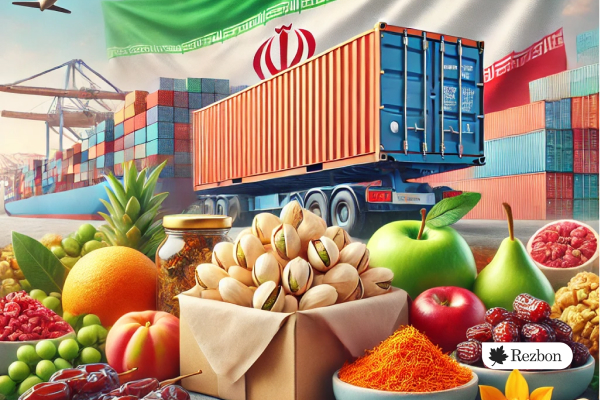Iran, with its diverse climate and rich agricultural heritage, is a major player in the global agricultural market. Its fertile lands produce a wide variety of products such as pistachios, saffron, dates, fresh fruits, and herbs, which are highly sought after in international markets. For importers looking to source agricultural goods from Iran, there are several critical factors to consider to ensure a smooth and successful transaction. This article outlines key considerations for those interested in importing agricultural products from Iran.
1. Understanding Iran’s Agricultural Export Landscape
a. Diverse Product Range
Iran is famous for its premium quality agricultural products, including:
- Pistachios: Iran is one of the world’s largest producers and exporters of pistachios, known for their high quality and unique taste.
- Saffron: Often referred to as “red gold,” Iranian saffron is a valuable export due to its exceptional aroma and color.
- Dates: With more than 400 varieties, Iranian dates are popular in many countries, especially the Middle East, Europe, and Asia.
- Fruits and Vegetables: Fresh produce like pomegranates, grapes, and melons are also important exports.
- Herbs and Spices: Iran’s herbs, including thyme and rosemary, are in high demand globally.
Understanding the specific product categories and their market positioning is essential for identifying the right opportunity for your business.
2. Regulatory and Compliance Factors
a. Export Regulations
Iran has strict guidelines regarding the export of its agricultural products. Importers must familiarize themselves with Iranian export regulations, including:
- Export Licensing: Some agricultural products may require specific licenses or certifications before they can be exported.
- Customs Documentation: Ensure that you have all the necessary documentation, including invoices, certificates of origin, and packing lists.
b. Compliance with Destination Country Standards
Importers must also ensure compliance with the agricultural and food safety standards of their own countries, including:
- Phytosanitary Certification: Many countries require proof that the products are free from harmful pests or diseases.
- Organic Certifications: If you are importing organic products, make sure they meet the standards of your market.
- Pesticide Residue Limits: Different countries have varying limits on pesticide residue. It is essential to ensure that the products you import adhere to these limits.
3. Logistics and Transportation
a. Cold Chain Management
Many agricultural products, especially fresh fruits and vegetables, are perishable and require specialized transportation, such as refrigerated containers. It is crucial to work with logistics partners who have experience in handling agricultural products and can ensure that the cold chain is maintained throughout the journey.
b. Shipping Routes and Timeframes
Iran has several ports, including Bandar Abbas and Chabahar, that handle agricultural exports. Importers should:
- Evaluate Shipping Times: Depending on your location, shipping times may vary significantly. Importers in Europe or the Middle East will experience shorter shipping times compared to those in North America or Asia.
- Choose Reliable Freight Forwarders: Work with freight companies that have experience in transporting agricultural goods from Iran to your market.
4. Quality Control and Inspections
a. Pre-Shipment Inspections
To avoid any issues related to product quality upon arrival, it is advisable to conduct pre-shipment inspections. Many importers hire third-party inspection companies to verify:
- Product Quality: Ensure that the product meets the agreed-upon specifications (e.g., size, taste, moisture content).
- Packaging Standards: Proper packaging is crucial, especially for fragile products like saffron and pistachios, which can be damaged during transit.
b. Sampling and Lab Testing
Before entering into large contracts, importers may want to request product samples and have them tested in accredited labs for quality assurance. Testing for pesticide residues, mycotoxins, and other contaminants is common practice in international trade.
5. Trade and Economic Sanctions
a. Navigating U.S. Sanctions
One of the biggest challenges in trading with Iran is navigating the economic sanctions imposed by countries like the U.S. Although agricultural products may be exempt from some sanctions, financial transactions with Iranian entities can be complicated. Importers should:
- Work with Legal Experts: Seek advice from legal experts who specialize in international trade law and sanctions.
- Use Authorized Financial Channels: Many international banks avoid transactions with Iranian entities, so it is important to find financial institutions that can legally handle payments for Iranian agricultural products.
b. Currency Exchange and Payment Terms
The Iranian rial can be a volatile currency, which can create challenges for pricing and payment terms. Many importers opt to pay in more stable currencies like euros or U.S. dollars. It is crucial to negotiate clear payment terms, including:
- Letters of Credit (L/C): A common method for ensuring secure payments in international trade.
- Escrow Services: In some cases, escrow services can be used to protect both the buyer and the seller.
6. Building Relationships with Iranian Suppliers
a. Cultural Considerations
Doing business in Iran requires an understanding of local customs and business etiquette. Building trust is key in Iranian business culture, and face-to-face meetings are highly valued. Importers should take the time to:
- Develop Long-Term Relationships: Establishing a strong relationship with your supplier can lead to better terms, pricing, and reliability.
- Work with Local Partners: Having a local representative or partner in Iran can help navigate the market and facilitate communication with suppliers.
b. Sourcing from Reliable Suppliers
It is important to vet your suppliers carefully. Many Iranian agricultural exporters are small or medium-sized businesses, so checking their track record, product quality, and reliability is essential. Using industry references and conducting due diligence can help you avoid potential issues.
Conclusion
Importing agricultural products from Iran presents significant opportunities, especially for those seeking high-quality, niche products like saffron, pistachios, and dates. However, importers must be prepared to navigate the complexities of international trade, including regulatory requirements, logistics, and economic sanctions. By following the key considerations outlined above, importers can successfully source agricultural products from Iran and build profitable, long-term partnerships with Iranian suppliers.


